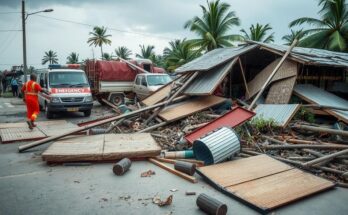The article outlines the escalation of Israeli air strikes in Beirut and Gaza, leading to significant civilian casualties and a deteriorating humanitarian situation. Prime Minister Netanyahu asserts the necessity of dismantling Hamas and degrading Hezbollah, while UN officials warn of an impending humanitarian crisis marked by a severe shortfall in funding and overwhelmed hospitals. The need for swift action to address the crisis and avoid further violence is underscored.
Israel has intensified its military operations against Hezbollah and Hamas, conducting heavy air strikes in southern Beirut, particularly in the Dahiyeh suburb, resulting in numerous casualties. In a recent address at the United Nations, Israeli Prime Minister Benjamin Netanyahu asserted that Hamas must be dismantled to prevent further attacks on Israel, stating, “If Hamas stays in power, it will regroup … and attack Israel again and again … so Hamas has got to go.” He also emphasized Israel’s commitment to countering Hezbollah along the Lebanon border, expressing, “Israel has every right to remove this threat and return our citizens to their home safely.” Furthermore, Netanyahu articulated concerns about Iranian influence in the region, declaring, “For too long, the world has appeased Iran. That appeasement must end and that appeasement must end now.” As a result of ongoing violence, more than 41,000 individuals have perished in Gaza, alongside 700 fatalities in Lebanon. In light of this humanitarian crisis, Philippe Lazzarini, the head of the UN agency for Palestinian refugees (UNRWA), advocated for support and sustainable funding to assist in reconstruction efforts post-conflict. He warned that the agency faces a significant funding shortfall that jeopardizes its operations beyond the end of October, highlighting the agency’s crucial role in establishing stability. The ongoing aerial bombardments have inflicted substantial damage, particularly in areas within the Bekaa Valley and close to the city of Baalbek. Reports indicate that civilian areas have not been spared, with a recent missile strike causing widespread destruction in central Gaza. Moreover, the humanitarian situation continues to intensify, with WHO officials warning that hospitals are overwhelmed with casualties, leading to a critical healthcare crisis. Imran Riza, the UN humanitarian coordinator, characterized the current period as the deadliest in Lebanon in generations, raising alarms about the potential for further escalation into a full-fledged regional conflict due to the ongoing violence.
The article addresses the recent escalation of hostilities between Israel and militant groups Hamas and Hezbollah, particularly focusing on the impact of Israeli air strikes in Lebanon and Gaza. The perspective of Israeli Prime Minister Benjamin Netanyahu is highlighted, emphasizing his stance on dismantling these groups to ensure Israel’s security. Additionally, it discusses the significant humanitarian implications of the conflict, including casualties, hospital overcrowding, and the vital operations of UNRWA amidst severe funding challenges. The remarks from international organizations underscore the urgent need for coordinated humanitarian assistance and potential political solutions to prevent further deterioration of the situation.
In conclusion, the situation in Lebanon and Gaza remains dire following a series of aggressive Israeli air strikes targeting Hezbollah and Hamas. Prime Minister Netanyahu’s statements underline Israel’s commitment to its security objectives while highlighting the broader regional implications of Iranian influence. As the humanitarian crisis escalates, international organizations stress the importance of funding for reconstruction and support for displaced populations. Immediate attention and action are necessary to mitigate the mounting casualties and prevent further bloodshed in the region.
Original Source: www.aljazeera.com




